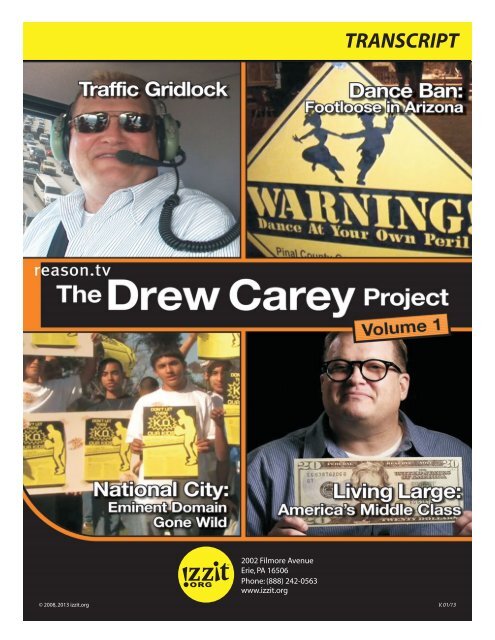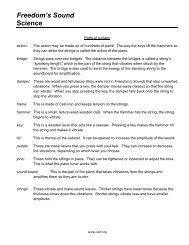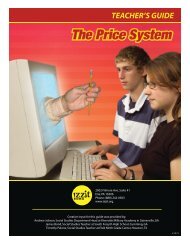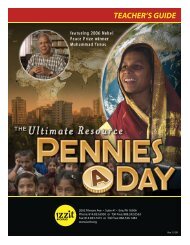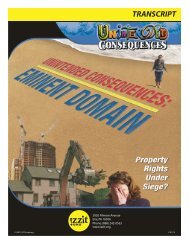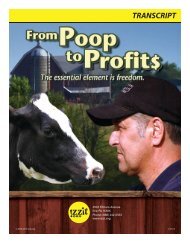The Drew Carey Project, Volume 1 Transcript - Izzit.org
The Drew Carey Project, Volume 1 Transcript - Izzit.org
The Drew Carey Project, Volume 1 Transcript - Izzit.org
Create successful ePaper yourself
Turn your PDF publications into a flip-book with our unique Google optimized e-Paper software.
TRANSCRIPT<br />
2002 Filmore Avenue<br />
Erie, PA 16506<br />
Phone: (888) 242-0563<br />
www.izzit.<strong>org</strong><br />
© 2008, 2013 izzit.<strong>org</strong><br />
V. 01/13
<strong>The</strong> <strong>Drew</strong> <strong>Carey</strong> <strong>Project</strong>, <strong>Volume</strong> 1<br />
<strong>Transcript</strong><br />
For a list of additional resources to use with this video go to<br />
www.izzit.<strong>org</strong>/products and click on the <strong>The</strong> <strong>Drew</strong> <strong>Carey</strong> <strong>Project</strong>, <strong>Volume</strong> 1 video.<br />
Program 1: Traffic Gridlock<br />
DREW CAREY: Hi, I’m <strong>Drew</strong> <strong>Carey</strong>, here at the corner of Sunset and Highland in Los Angeles,<br />
California, one of the worst intersections in all of Los Angeles. It’s only a quarter after 4:00. <strong>The</strong>y<br />
already have a traffic cop in the middle of the intersection directing traffic. He’s here all the time. <strong>The</strong><br />
traffic goes all the way back in each direction blocks and blocks. <strong>The</strong>re’s no end in sight to it. Los<br />
Angeles, along with a lot of other cities like Portland, San Francisco, Minneapolis, you know, traffic is<br />
the #1 concern, the #1 complaint among the people that live here and like a lot of places in America, it’s<br />
only going to get worse. So, you live in LA, right?<br />
MALE RESIDENT 1: I do.<br />
CAREY: And what do you think about the traffic here?<br />
MALE RESIDENT 1: It sucks.<br />
MALE RESIDENT 2: It’s disgusting.<br />
CAREY: Yeah. Everyone in LA complains about traffic but we didn’t want to talk to just anyone. We<br />
wanted to talk to the poor soul with the most congested commute in LA. We asked John and Ken from<br />
radio station KFI AM 640 for help.<br />
DJ JOHN: So we teamed up with <strong>Drew</strong> and the Reason Foundation to start the Most Congested<br />
Commute here in the LA area.<br />
DJ KEN: Remember, not the longest commute. Those of you who have been stuck in a whole lot of<br />
traffic is what we’re looking for.<br />
CAREY: And you can’t have a car driving you there either. I don’t want to hear from Harvey Weinstein<br />
about how bad his commute is.<br />
DJ KEN: I hear people say this. <strong>The</strong> no. 1 reason they’d want to move out of LA…..<br />
DJ JOHN: Traffic.<br />
DJ KEN: ...is the traffic<br />
CAREY: Yeah, but you guys like congestion because it keeps people listening to your radio.<br />
2
DJ JOHN: Yeah. No, we freely admit that.<br />
CAREY: Well, we heard plenty of traffic sob stories and finally found our contest winner. Meet graphic<br />
artist Josh Lipking.<br />
JOSH LIPKING: I do this every morning. Check out Sig Alert, Google traffic.<br />
CAREY: Every day he kisses his wife goodbye—<br />
LIPKING: Love you, girl.<br />
JOSH’S WIFE: Love you, too. Bye—<br />
LIPKING: Have a good day.<br />
JOSH’S WIFE: You, too.<br />
CAREY: And drives into hell.<br />
LIPKING: That’s when, you know, you get this heart pumping in your chest. You start to sweat a little<br />
and just kind of bite the bullet and just go for it.<br />
CAREY: But he tries to make the most of the time he spends stuck in traffic.<br />
LIPKING: So, this is a great little tool, 1-hand flossier. And it’s slow enough where, you know, people<br />
are putting on their makeup, people are shaving. I had chicken for dinner last night.<br />
CAREY: You know, if you get tired of the traffic in LA you can always take the bus if you have a day<br />
and a half to get to work.<br />
LIPKING: Oh, I’ve used transit.<br />
CAREY: Josh actually gave his car away and he used public transit for over a year but it turned out the<br />
bus was even slower than driving.<br />
LIPKING: <strong>The</strong> transit out here is stuck in the traffic.<br />
CAREY: So Josh eventually bought another car. Josh lives only 16 miles from work but it often takes<br />
him an hour and a half to get to the office. At the end of the day, it’s the same fight to get back home - 3<br />
hours a day! No one should have to live like this. We’ve got to find a way to speed up Josh’s commute.<br />
CAREY: What would you do about traffic if you were the king of Los Angeles?<br />
MALE RESIDENT 1: If I was the king of Los Angeles? Hmmm, well I think we’re pretty much<br />
screwed.<br />
CAREY: I’d make people use their gas pedal more and I’d make them pull all the way up to the bumper<br />
in front of them.<br />
3
CAREY: On the “John and Ken Show,” I suggested other ways to bust congestion, like letting private<br />
companies pay for roads.<br />
DJ KEN: Well, how would that help?<br />
CAREY: Well, first of all, taxpayers wouldn’t have to pay for the road. Like I was talking to somebody<br />
from the Reason Foundation at dinner and I go what do you think we should do about something like the<br />
101 and he goes just double-decker it and I go “Who’s going to pay?” and he says, “Let a private<br />
company do it and they can charge people to ride on the road. You can get a Fast Pass and you pay 5-<br />
bucks.”<br />
DJ JOHN: Sure, the top deck could be for the tolls.<br />
CAREY: Yes. And if you privatize it, you can have different companies bidding—I would love to own<br />
a freeway in LA<br />
DJ JOHN: <strong>The</strong> <strong>Drew</strong> <strong>Carey</strong> Freeway?<br />
CAREY: Yeah—Maybe the <strong>Drew</strong> <strong>Carey</strong> Freeway would look something like this snazzy double-decked<br />
toll road in Tampa, Florida or maybe I’d build my road underground. Here’s a tunnel that’s being built in<br />
Paris. Tunnels that run underneath Australian cities help people get around town. <strong>The</strong> private sector paid<br />
for all these.<br />
LIPKING: Life would be much happier without the congestion.<br />
CAREY: So, let’s build the Josh Lipking tunnel. Double-deck one of the freeways he uses or, hey, how<br />
about building some special express lanes like the one accountant Cedric Allen uses.<br />
CEDRIC ALLEN: Oh, this piece of paper - this is the billing statement for using the 91 Express<br />
Lane,168 total trips valued at a cost of $548 which people see that and they’ll go, “WOW, you spend that<br />
much?”<br />
CAREY: <strong>The</strong> 91 Express Lanes isn’t your typical toll road. A private company built it in the middle of<br />
the 91 Freeway in Orange County, California. <strong>The</strong> express lanes run right next to the regular lanes so<br />
drivers can choose to use them or not and you don’t have to stop at toll booths. Tolls are collected<br />
electronically from this gadget that hangs overhead. When traffic gets bad the price of the toll rises. <strong>The</strong><br />
OCTA owns the 91 Express Lanes. Here’s spokesman Ted Nguyen.<br />
TED NGUYEN: <strong>The</strong> average toll is about $2.76. <strong>The</strong> low end is about $1.50 and the high end is about<br />
$9.50.<br />
CAREY: Sounds pricey but each day about 40,000 people pay the toll because the special lanes let them<br />
zoom past slow-moving traffic. Mailman Demetrius Mikes battles through congestion on his way home<br />
but once he hits the express lanes his commute speeds right up.<br />
DEMETRIUS MIKES: To me it saves you about an hour and a half to two hours.<br />
CAREY: Traffic often keeps parents from picking up kids at day care on time. Imagine paying five<br />
bucks for each minute you’re late. Cedric knows all about that.<br />
4
ALLEN: On an average week we would probably spend about $40.00 per child times three. That’s<br />
$120.00 a week for being a few minutes late.<br />
CAREY: $120.00 a week. Once he started using the express lanes Cedric almost never had to pay late<br />
fees, so paying a little can end up saving you a lot of money and time.<br />
DEMETRIUS MIKES: Oh, with the extra time I do my school work, you know, talk to my son, just<br />
time to relax.<br />
ALLEN: Have more time to prepare a decent meal. I have more time to spend with the family and<br />
possibly even get in a movie before going to bed at night.<br />
CAREY: Unpredictable traffic makes it hard for Josh to make plans even with his wife but with an<br />
express lane, he could always make it home in time for dinner.<br />
LIPKING: <strong>The</strong> 91 Toll Expressways—I think that’s a great idea.<br />
CAREY: So, let’s see. Express lanes, tunnels, double-deckers, anything else we could do to get Josh<br />
home fast?<br />
MALE RESIDENT 2: <strong>The</strong>re has to be some other ways to travel, like they should the use the air.<br />
CAREY: Use the air? Hmmm—<br />
CAREY: Hey man, I’m <strong>Drew</strong>. Nice to see you. How are you? Getting ready for the easiest way to<br />
work you ever had in your life?<br />
LIPKING: Yeah, let’s go for it.<br />
CAREY: Yeah, come on. Follow me.<br />
CAREY: Hope the helicopter doesn’t crash. <strong>The</strong> best words to show at my funeral though if it does.<br />
LIPKING: This is the way to go. I’ve got to get my stuff set up to do this every day.<br />
CAREY: Do traffic report.<br />
LIPKING: Ten (10) west bound looking slow. Josh Lipking, Traffic Copter 12 in the sky.<br />
LIPKING: So, that was a blast, huh?<br />
LIPKING: Yeah, exactly. Thanks.<br />
CAREY: At the end of the day, Josh rode the chopper back home. So long, 90-minute commute.<br />
LIPKING: My commute - only 9 minutes. I have no idea what it even looks like in my neighborhood at<br />
5:00 p.m. I’m going to go inside, have some dinner with my wife. This is the greatest thing. Thanks a<br />
lot.<br />
5
CAREY: Such a happy ending or is it? We can’t keep flying Josh to work so it’s back to the gridlock<br />
grind for him first thing tomorrow. Now, we could build some express lanes, tunnels, and doubledeckers.<br />
Taxpayers wouldn’t even have to pay for it. <strong>The</strong>n Josh, bus riders, and other commuters could<br />
escape congestion every day and, hey, if we could beat gridlock in LA, we could beat it anywhere, but if<br />
you’ve live in Los Angeles as long as I have, you really shouldn’t have much hope. It’s okay, though,<br />
because I have a helicopter.<br />
For Reason.tv, I’m <strong>Drew</strong> <strong>Carey</strong> and I’m out of here in a helicopter.<br />
Banner:<br />
<strong>Drew</strong> got home in 7 minutes.<br />
It took the crew 75 minutes.<br />
But who’s counting?<br />
For a list of additional resources to use with this video go to<br />
www.izzit.<strong>org</strong>/products and click on the <strong>The</strong> <strong>Drew</strong> <strong>Carey</strong> <strong>Project</strong>, <strong>Volume</strong> 1 video.<br />
6
Program 2: Living Large: America’s Middle Class<br />
DREW CAREY: Ah-h-h, isn’t life in America great? But maybe I’m just an out-of-touch rich guy.<br />
Wonder what it’s like for the middle class in America?<br />
CNN LOU DOBBS: What’s left of our middle class may be on the verge of collapse.<br />
CNN NEW YORK ANCHOR DESK: <strong>The</strong> American dream is under siege.<br />
CNN LOU DOBBS: Corporate America posting record profits so why in the world are middleclass<br />
Americans suffering from declining pay and standards of living?<br />
CAREY: Well, that’s a good question, Lou. We headed to California’s Castaic Lake to confront some<br />
fat cats as they played around in the water with hardly a care in the world.<br />
TOURIST: Ha, ha, ha.<br />
CAREY: Nothing but fast toys, Hummers and Escalades. Of course, their owners were happy to brag<br />
about them.<br />
BOAT OWNER 1: It’s a Yamaha. It’s a twin-engine high output.<br />
CAREY: Ever seen the price tag for a 27-foot boat?<br />
BOAT OWNER 3: Oh, it cost $50,000.<br />
BOAT OWNER 2: It’s a special boat like for wakeboarding.<br />
MALE 2: Well, you need something to tow it, right? Ha Ha Ha.<br />
BOAT OWNER 2: Every day that they wake up, they believe that this day is going to be better than<br />
yesterday.<br />
CAREY: Yeah. Well, today is going to be better than yesterday if all you gotta to do today is go<br />
wakeboarding. This rich guy sees the world through rose-colored designer glasses, probably a trust fund<br />
kid who doesn’t even have a job.<br />
INTERVIEWER VOICE: What do you do for a living?<br />
BOAT OWNER 2: I’m a gardener.<br />
CAREY: A gardener? Well, this guy’s gotta be a fat cat CEO.<br />
INTERVIEWER VOICE: What’s your job?<br />
BOAT OWNER 3: I sell building materials.<br />
7
INTERVIEWER VOICE: So you must be like a corporate CEO or something, right, to support<br />
something like this?<br />
BOAT OWNER 1: Uh, no. Law Enforcement.<br />
CAREY: A cop with a big boat and a Hummer. Ah ha. Here’s an auto mechanic who must be<br />
struggling. He’s got no boat.<br />
INTERVIEWER VOICE: Yeah, do you have a boat like this or—<br />
MALE 1: No. I have motorcycles.<br />
INTERVIEWER VOICE: Yeah. What kind of motorcycles do you have?<br />
MALE 1: Oh, Hondas, Harleys, Suzuki. Got ‘em all.<br />
CAREY: <strong>The</strong> boat belongs to his buddy, a truck driver. How can guys with regular jobs afford all this?<br />
Maybe we just happened to visit the lake during the lottery winners’ reunion.<br />
MICHAEL COX: Well, that is America’s middle class today. It’s amazing the amount of stuff they’re<br />
able to own and their consumption levels that they achieve today compared to the past.<br />
CAREY: Economist Michael Cox is co-author of Myths of Rich and Poor, Why We’re Better off than We<br />
Think. He says the middle class is doing great but that’s not what we hear on TV.<br />
CNN LOU DOBBS ANCHOR 1: <strong>The</strong> problem is their wages are low, they…<br />
CNN ANCHOR 2: <strong>The</strong>y’re reeling from stagnant wages.<br />
MICHAEL COX: So many things wrong with that. First of all, those wages don’t include the benefits<br />
that we bargain for - we demand.<br />
CAREY: Even if you add in benefits, how much you earn is only part of the story. How much things<br />
cost. Now, that’s another important part.<br />
MICHAEL COX: Is the cost of everything going down? No. Is the cost of the vast array of things that<br />
Americans purchase going down? Absolutely.<br />
CAREY: What? That’s not what other people say.<br />
CNN LOU DOBBS ANCHOR 3: It’s dangerous. It’s a vicious, vicious cycle. Everything’s going up.<br />
CAREY: Money is how we usually measure the cost of living, but Cox thinks we should use something<br />
more important to us—our time.<br />
MICHAEL COX: Really, the best way to measure cost is in terms of work time. How long do I have to<br />
work in order to afford to buy something? So, let’s just take a product, for example, the cell phone.<br />
CAREY: <strong>The</strong> classic ’80s movie Wall Street takes us back to the early days of the cell phone when<br />
corporate big shots went cordless with their $4,200 bricks.<br />
8
MALE CHARACTER OF MOVIE: My wife tells me you made a move on Darien.<br />
CAREY: Few regular people could afford cell phones because the average worker had to sweat for 460<br />
hours to buy one. Boy, how times have changed.<br />
MICHAEL COX: So this $50.00 phone is less than 3-hours of work; 460 then, 3 now. Huge declines in<br />
prices enabling these things to be afforded by the middleclass and many other products, too.<br />
CAREY: Only the rich owned cars a century ago, but today average Americans can afford shiny SUVs.<br />
In terms of time, the cost of a car has fallen by more than 70%. <strong>The</strong> story is the same for necessities.<br />
Food is 84% cheaper. Clothing is 87% cheaper.<br />
MICHAEL COX: So food’s going down. Clothing is going down. Housing is going down in cost. We<br />
look at the houses and we see that they’re much more expensive in money terms, but the houses are also<br />
two-and-a-half times as large as back then and they have all the amenities.<br />
CAREY: Today, the typical new home comes equipped with a dishwasher, stove, microwave, fireplace,<br />
central heat and air and a bunch of other amenities that weren't standard in homes 50 years ago, let alone a<br />
century ago. <strong>The</strong> falling cost of living allows regular Joes to own boats, vacation at lakes and fly around<br />
the world. We checked it out. <strong>The</strong> cost of a cross-country flight has plummeted by 95%.<br />
MICHAEL COX: When the flights first came out, they were the exclusive purview of the rich, the jet<br />
set, but now the jet set includes just you get on planes and look, there’s people there of all income levels.<br />
CAREY: Such progress and yet so many middleclass Americans feel lousy.<br />
CNN NEWS REPORTER: And only 19% of middleclass Americans feel they are getting ahead in life.<br />
CAREY: Gee, I wonder why? Maybe they’d be in a better mood if news programs weren’t packed with<br />
doom and gloom but, you see, bad news gets ratings.<br />
4-DIFFERENT ANCHOR DESKS: whether they’ll ever have the kind of . . . all the days. . .<br />
CAREY: Remember the auto mechanic who collects motorcycles?<br />
MALE 1: Works good. Plenty of it. Just got another raise. Everything is good.<br />
CAREY: Even folks who say things are going well for them are often convinced times are tough for<br />
everyone else.<br />
MALE 1: Yeah. <strong>The</strong>re’s some big guys and then there’s the poor people and there’s really no<br />
middleclass anyway.<br />
MICHAEL COX: <strong>The</strong>se are things that they hear about propagated in the media.<br />
MALE 1: I guess the middle class is always getting squeezed.<br />
CAREY: Sure seems like he’s been watching a lot of TV.<br />
9
CBS SUNDAY MORNING: …squeezed is what a lot of middle class Americans are these days.<br />
CNN ANCHOR 4: …the middle class squeeze.<br />
CBS REPORT PUBLIC RESPONSE: <strong>The</strong>re is a squeeze.<br />
CAREY: If middle class folks aren’t getting squeezed, they’re told they’re victims of war.<br />
CNN LOU DOBBS: Corporate American escalating its war against the middle class.<br />
CAREY: And it’s always more difficult to…<br />
CBS REPORT PUBLIC RESPONSE: …make ends meet.<br />
CNN LOU DOBBS: …make ends meet.<br />
CNN REPORT PUBLIC RESPONSE: It’s very, very difficult to make ends meet.<br />
MICHAEL COX: But if you’re willing to settle for a living standard of the 1970s, it’s easier to make<br />
ends meet. It’s not the high cost of living. It’s the cost of living high. It’s the fact that we insist on<br />
having so much more.<br />
CAREY: Too bad putting things in perspective is rarely considered newsworthy.<br />
CBS NEWS REPORTER: But today much of the American middle class is struggling.<br />
CAREY: It’s much easier to stir up anxieties.<br />
CNN REPORTER REPORT: <strong>The</strong> Iraq War may be Democratic voters’ top issue but economic anxiety<br />
comes next and…<br />
CAREY: And bad news doesn’t just get ratings. It also gets votes.<br />
CNN REPORT – HILLARY CLINTON’S SPEAKS: While productivity and corporate profits are up,<br />
the fruits of that success just hasn’t reached many of our families. It’s like trickle-down economics but<br />
without the trickle.<br />
MICHAEL COX: If your life is bad, it’s clearly cruel and unfair. Vote for me and I’ll help.<br />
CAREY: It’s a bipartisan theme.<br />
PRESIDENT BUSH SPEAK: <strong>The</strong> fact that our dynamic economy is leaving working people behind…<br />
MICHAEL COX: <strong>The</strong>re are people suffering out there and there’re always been people suffering out<br />
there. <strong>The</strong>re will always be people suffering out there. <strong>The</strong> poor you’ll always have with you, but how<br />
does it compare to the past? Americans are richer today than in any time in history. We should really be<br />
thankful that we live in a society where we don’t have to work day and night in order just to be at a living.<br />
10
CAREY: We can spend more time with family and friends because it takes less time for us to buy the<br />
things we need, so if you look at it that way, the future will be even better than today. So, don’t worry.<br />
You’ll still be able to tell your kids how tough you had it compared to them.<br />
For Reason.tv, I’m <strong>Drew</strong> <strong>Carey</strong>.<br />
For a list of additional resources to use with this video go to<br />
www.izzit.<strong>org</strong>/products and click on the <strong>The</strong> <strong>Drew</strong> <strong>Carey</strong> <strong>Project</strong>, <strong>Volume</strong> 1 video.<br />
11
Program 3: Dance Ban<br />
DREW CAREY: Hi, I’m <strong>Drew</strong> <strong>Carey</strong>. I was in the moving Robots with Halle Berry. I’m Craig, the<br />
yellow robot, and Halle’s the cute silver robot. Halle Berry starred in Bullworth with Warren Beatty who<br />
co-starred with Goldie Hawn in Shampoo who was in First Wives Club with Sarah Jessica Parker who<br />
was in Footloose with, you guessed it, Kevin Bacon.<br />
Remember Footloose? It’s that film from the ’80s about high school kids fighting for the right to dance.<br />
Quaint, right? Well, believe it or not, we found our very own Footloose story in the Arizona desert.<br />
Somehow they knew we were coming.<br />
SPENCER BELL: Well, my name is Spencer Bell. I’m a junior at ASU. I’m going to the William P.<br />
<strong>Carey</strong> School of Business for business management.<br />
DALE BELL: Well, my name is Dale Bell and I, along with my son, Spencer, built the San Tan Flat<br />
Steakhouse here in Queen Creek, Arizona.<br />
SPENCER: <strong>The</strong> idea for San Tan Flat kind of came along. My dad and I were driving in a car and my<br />
dad turned to me and said, “You know, Spencer, what do you want to do with your life? What do you<br />
want to do for a job or profession?” And I turned to him and I said, “Well, you know, I want to get into a<br />
business, a small business, where a Wal-Mart, Costco, another big box store is not going to beat me up<br />
out of it.” He turned to me and said, “Well, the only business that I know of where you can do that is the<br />
restaurant business.”<br />
DALE: When he suggested he’d like to go into small business I thought it’d be the perfect thing for him<br />
to learn a small business and the difficulties involved in that and be part of the American dream. We have<br />
one neighbor that actually lives on the property that joins our property and his name is Paul Younger and<br />
he’s a beekeeper. Paul initially was the only person who showed up in opposition to our rezoning.<br />
PAUL YOUNGER: I opposed it because of the lights and the noise and the smells and traffic and<br />
everything else I thought would be detrimental to our lifestyles here.<br />
DALE: When we were approved (our plan was approved by the county supervisors) we actually received<br />
a standing ovation.<br />
PAUL: When the meeting was over and it became obvious that he was going to get approval, I asked<br />
him to please have some consideration for the neighbors here and he assured me that he would.<br />
SPENCER: It was exciting - exciting to finally see the doors open.<br />
PAUL: I was really pleasantly surprised. <strong>The</strong> impact was very minimal and it’s been a convenience to<br />
have him close by.<br />
DALE: When people would walk into the courtyard and see those bonfires and this atmosphere, this<br />
ambience, from all these old wagons and buggies and all the antiques that have been collected here, the<br />
word that most often was mentioned was “awesome.” People would say this is awesome.<br />
12
CAREY: Dale and Spencer soon found out, however, that not everyone was excited to see San Tan Flat<br />
open.<br />
DALE: We weren’t breaking any laws but Pinal County apparently decided that they did not like us and<br />
decided that they wanted to put a noise ordinance in, as they did have a neighbor complain about some of<br />
the noise, and they put one of the strictest in the state of Arizona. In fact, the sound of a sewing machine<br />
is louder than we are allowed to be with our country western music venue here.<br />
PAUL: Dale called and asked me if the music was too loud, if it was bothering me or anything else and I<br />
really hadn’t even noticed it that much.<br />
CAREY: In addition to the noise levels, the County hassled Dale and Spencer about everything, from the<br />
size of their parking lot to the number of signs along the road and the kind of wood they burned in their<br />
fire pits. Dale and Spencer’s efforts to comply cost them more than a hundred thousand dollars but<br />
County officials still weren’t satisfied. <strong>The</strong>y decided to invoke a 60-year-old ordinance.<br />
DALE: Dancing they said in Pinal County is illegal if it’s done outdoors.<br />
(Music: “<strong>The</strong>re’s an Arizona county where some taverns. . .”)<br />
CAREY: Based on the County’s ruling which Dale and Spencer are fighting in court, each day San Tan<br />
Flat patrons are caught dancing, Dale and Spencer must pay a $700.00 fine. Over the course of a year the<br />
fines would total more than two hundred thousand dollars.<br />
DALE: Well, there’s no logic behind why a government would not want to allow dancing that I can<br />
come up with.<br />
MALE PATRON 1: I think it’s ridiculous. Dancing is a natural God-given right.<br />
FEMALE PATRON 1: Dancing is so much fun.<br />
FEMALE PATRON 2: Why stop it?<br />
FEMALE PATRON 1: It’s good music. You might as well dance and have fun.<br />
FEMALE PATRON 3: All I have to say is: “Look at the crowd.”<br />
MALE PATRON 2: Dancing is part of life.<br />
FEMALE PATRON 4: I think that it is…it’s bad business as far as the County is concerned . . .<br />
(MUSIC)<br />
DALE: We have - we’ve asked everyone, everyone that we know that might have a clue as to why Pinal<br />
County would attack this family-friendly good business and no one has been able to come up with a<br />
logical explanation.<br />
PAUL: Maybe someone is trying to use our County regulations to harass San Tan Flats into either<br />
submission or into some sort of a bankruptcy or financial situation where it has to be put on the market<br />
13
and sold and there are people around here with money that would probably be interested in buying it at a<br />
real cut rate.<br />
DALE: Had it not been for the government’s assault upon this venue, this would’ve been a - just almost<br />
a dream come true for a small businessman because it was met with so much support and praise.<br />
SPENCER: Because of this experience I see how government can be so abusive of its power even on a<br />
small local level. It doesn’t have to be federal. Even our Pinal County government is just way overstepping<br />
their bounds.<br />
DALE: <strong>The</strong>y’re going to have to take me on all the way to the Supreme Court of this state and wherever<br />
else we can go beyond that, if necessary, because I don’t believe the government has any right to tell<br />
people they can’t express themselves and they can’t dance. [Music: “liberty . . . “]<br />
CAREY: So if you ever find yourself in Arizona on the road between Phoenix and Tucson, swing on by<br />
San Tan Flat. I hear it’s a great place to dance.<br />
For Reason.tv, I’m <strong>Drew</strong> <strong>Carey</strong>.<br />
(Music: “Yes, everywhere there’s freedom, there’s someone who wants to take it and in Arizona, it’s<br />
Pinal County…)<br />
Banner: Pinal County officials refused to comment on this case and declined our request for an<br />
interview.<br />
For a list of additional resources to use with this video go to<br />
www.izzit.<strong>org</strong>/products and click on the <strong>The</strong> <strong>Drew</strong> <strong>Carey</strong> <strong>Project</strong>, <strong>Volume</strong> 1 video.<br />
14
Program 4: National City<br />
JOSE VARGAS: I got in trouble when I was maybe - when I was maybe 15, 16 years old, I got arrested<br />
for armed robbery with a firearm. I just didn’t know better. I grew up in a family which I thought being<br />
in a gang was being part of being - being - that was the every-day of life. My grandmother was a gang<br />
member. My grandpa was a gang member. I didn’t know better.<br />
DREW CAREY: You know, I live in a really nice neighborhood, thankfully, and the people in my<br />
neighborhood, their kids have very good lives, very bright futures, but everyone knows that life is much<br />
harder for kids who grow up in inner cities. <strong>The</strong>y often come from poor, single-parent homes and too<br />
often get involved in gangs and criminal activity. We went down to National City, California and met<br />
some really great people who’ve devoted their lives to helping at-risk kids in their neighborhood.<br />
VICTOR NUNEZ: National City is a very nice neighborhood, a lot of single-family homes. We do<br />
have a gang problem and we have problems with drugs as in any other community. <strong>The</strong> Community<br />
Youth Athletic Center pretty much started out in 1991 in the backyard of Mr. Carlos Barragan, Jr. and<br />
Carlos Barragan, Sr. Pretty soon, we had so many kids that we had to find a bigger building. With the<br />
help of UPS and the Barona Band of Mission Indians, we were able to expand to the facilities that we<br />
have now. We handle about a thousand kids per year and they are all at-risk kids. All these kids are kids<br />
that have been kicked out of various other programs. <strong>The</strong>y come to us. <strong>The</strong>y need a family and we<br />
provide them the family. We provide them the guidance and we provide them the ability to succeed in<br />
life.<br />
VARGAS: My name is Jose Vargas. I got involved in the gym probably approximately around 1997<br />
after I was - I was released from Rancho del Campo and now I’m applying for the National City Police<br />
Department and hopefully everything goes well. Hopefully next time I talk to you guys I’ve passed and<br />
I’m a police officer.<br />
NUNEZ: <strong>The</strong>re’re many benefits to the kids that come through here. <strong>The</strong> biggest benefit is that we will<br />
not see these kids in the prison system or the criminal justice system.<br />
CAREY: <strong>The</strong> CYAC is a great example of ordinary citizens taking responsibility for improving their<br />
community. You’d think city officials would do everything possible to support their efforts but, instead,<br />
the city wants to replace the gym with a swanky high-rise condo. Jeff Rowes is an attorney for the<br />
Institute for Justice, the non-profit public interest law firm that represents the CYAC.<br />
JEFF ROWES: Right here in National City is really one of the most egregious examples of the abuse of<br />
eminent domain that I’ve encountered since I joined the Institute for Justice.<br />
NUNEZ: What they’re saying is this is what we’re going to do and we want you to cooperate with us. If<br />
not we’re going to eminent domain you and take your property.<br />
ROWES: Eminent domain, as you might know, is the traditional power of government to take property<br />
for a public use. Really, public use has traditionally, until about the end of the Second World War, really<br />
just meant a public use. In other words, the government could take your property for a road or a school or<br />
a post office or a military base or a public park.<br />
15
NUNEZ: If the city was coming in and saying we’re going to build a road here or we’re going to build<br />
something that’s going to benefit everybody, I don’t think we could really fight with it, but what they’re<br />
doing is lining the developer’s pockets and lining their pockets.<br />
CAREY: Brad Raulston is the Director of Redevelopment in National City, California.<br />
BRAD RAULSTON: <strong>The</strong>re’s two key boundary lines. <strong>The</strong>re’s the redevelopment plan area which is the<br />
red line which was the whole redevelopment area and then there’s the area within that where the agency<br />
has the ability to use eminent domain. Within that footprint of the ability to use eminent domain, as I<br />
understand it, there are six or seven hundred parcels in that area.<br />
ROWES: <strong>The</strong> typical eminent domain story is a modest neighborhood or a modest collection of small<br />
businesses that a wealthy developer wants so the developer can transform it into high-rise condominiums<br />
or a big box store.<br />
RAULSTON: I believe our residents want redevelopment. <strong>The</strong>y want to see their city move forward.<br />
<strong>The</strong>y don’t necessarily engage in the details of that such as eminent domain. I mean, to be honest with<br />
you, I’m not sure that - I’m not sure how many of the residents would - would know what that even<br />
means.<br />
CESAR ANDRIGUEZ: Yes, my name is Cesar Andriguez. I’m past president for three terms here at<br />
the National City Eagles 2712 and the eminent domain concerns me very deeply because of our roots here<br />
in National City and I think it’s an unjust issue that not is only going on in National City but throughout<br />
our country, of government officials and private developers coming in and just wiping us off the map.<br />
MICHAEL RAMOS: Just right from the very core of my heart I think it’s wrong to take away<br />
somebody’s property when they don’t want to sell it.<br />
RAMOS: So any time you move, it’s bad thing and this is my street traffic where people - we’re on Mile<br />
of Cars and we’re the closest motorcycle shop to the world’s largest naval base.<br />
How many hours of sleep have I already lost? You know, I’ve lost a ton of hour of sleep. You just sit<br />
there. You can’t - what’re you going to do? <strong>The</strong>re’s enough uncertainty in business anyway and then<br />
literally not just pulling the rug out from underneath you but pulling the concrete slab and the land that<br />
you’re working and building on. That makes it tough, you know, so….<br />
RAULSTON: <strong>The</strong> benefits of redevelopment are predominantly economic.<br />
NUNEZ: If all you’re looking at is money and that’s it, I’ll agree with it that they, you know what, get<br />
rid of everybody here, but that’s not what life’s all about. That’s not what this Constitution tells us.<br />
RAULSTON: <strong>The</strong> argument against eminent domain is an easy one to make because it’s fundamental to<br />
property rights which are fundamental to the American way, the American dream.<br />
NUNEZ: As you can see, we have a boxing ring. We teach these kids not to give up, to fight for what<br />
they believe in.<br />
CAREY: On June 19 th , 2007, the CYAC held a public rally to protest the City’s plans.<br />
16
ROWES: <strong>The</strong> government should not be taking your hard-earned property and your American dream to<br />
give to rich people to build condos for other rich people.<br />
CROWD: Yeah! (Applause)<br />
ROWES: National City often talks about blight. <strong>The</strong>y say that everyone here is blighted. <strong>The</strong>y have<br />
two-thirds of the city under a blight designation and it’s been like that for almost 40 years. Take a look<br />
around. You people are Americans.<br />
CROWD: Yeah! Yeah!<br />
ROWES: You’re not blight.<br />
CROWD: Yeah, right. (Applause) Save our gym. Save our gym. . . .<br />
MALE RESIDENT 1: I think it’s a shame what the city’s trying to do our gym. <strong>The</strong>y’re trying to take it<br />
away from us. A lot of people have a lot of, you know, hope and dreams when they come to the gym, you<br />
know, to get through their everyday lives and, you know, it’s a shame that the city’s going to try to take<br />
that away from us, you know.<br />
MALE RESIDENT 2: That’s my home right there, you know. You know, I’ve started at 8-years old.<br />
For them to take it away, it seems pretty - it’s pretty tough.<br />
CROWD: Save our gym. Yeah! Yeah! Whooo—<br />
CAREY: Following the rally the City Council held a public hearing regarding their redevelopment plans.<br />
DEVELOPER SPOKESPERSON: We hope to be concluded by next March and now we’re ready to<br />
move forward on some of the remaining portions, including Chula Vista National City and, of course…<br />
NUNEZ: That last hearing that we had here, one of the kids came before you and told you, “I was the<br />
one that was tagging your places. I was the one that was breaking into your homes and so forth, but<br />
because of CYAC, I changed my life.”<br />
MALE SUPPORTER 1: You can bring in an incredible beautiful condo tower with lots of tax money<br />
but it’s not going to do the same amount of good that we’re doing. Just consider that. Have open minds.<br />
Take a leap of faith, okay? Just, please, keep supporting us. Do the right thing. Save our gym. Thank<br />
you very much. [Applause]<br />
MALE SUPPORT 2: When it’s all said and done, Your Honor, we’re not going to move. We’re going<br />
to stay here. (Applause) We’re going to stay in the location we are right now. (Applause) because our<br />
home…. (Applause)<br />
RON MORRISON (MAYOR): I understand what you’re saying, but I think the impression is being<br />
given out there that we’re trying to kick the kids out and you know this by using children in abundance<br />
your get these 2 things, and you get a lot of sympathy and you get cameras when you do that and there’s<br />
been I think a lot of approach to go out there and try to sensationalize this as if the city was doing<br />
something bad to you and I’m here to state for everyone, right here and now, that is really a bad rap that<br />
some irresponsible <strong>org</strong>anization is trying to give the city because we have worked diligently and we will<br />
continue to work diligently to find a good location.<br />
17
CAREY: On July 17 th , 2007, the National City Council voted to move forward with their plan to<br />
redevelop the city using eminent domain.<br />
RAULSTON: We had a Council person last night who sort of spoke to eminent domain being a tool and<br />
that he equated it to being sort of like a police officer’s gun, that’s best when never used, but needed in<br />
order to sort of keep the peace.<br />
ROWES: <strong>The</strong> threat of eminent domain is like having a gun put to your head when you’re negotiating<br />
the sale of your home. It’s just not a negotiation at all. People just don’t have a choice when eminent<br />
domain is on the table.<br />
NUNEZ: Our whole focus has been the kids. We are not going to quit and we’re not going to let them<br />
down. <strong>The</strong>y know that we are a family and this time we will take care of them. <strong>The</strong>y may not have a<br />
both mother and father at home, but we are here for them. We are their family.<br />
CAREY: For Reason.tv, I’m <strong>Drew</strong> <strong>Carey</strong>.<br />
Banner: In late August, in the face of intense public apposition, the developer of the condo project<br />
announced that he would revise his plans and build around the Community Youth Athletic Center. So the<br />
gym remains, for now. Unfortunately, the promise to keep the gym safe from bulldozers is not legally<br />
binding and the site still can be condemned by the city at any moment. Indeed, National City’s leaders<br />
recently again declared the entire area “blighted” and gave the city the power to seize the gym for private<br />
developers at any time up until 2017. <strong>The</strong> community Youth Athletic Center has filed suit in California<br />
Superior Court challenging the city’s blight declaration against the gym and nearly 700 other properties.<br />
For a list of additional resources to use with this video go to<br />
www.izzit.<strong>org</strong>/products and click on the <strong>The</strong> <strong>Drew</strong> <strong>Carey</strong> <strong>Project</strong>, <strong>Volume</strong> 1 video.<br />
18
We are very interested to learn<br />
how you use our material. Please<br />
share your experiences or lesson<br />
plan ideas by visiting us<br />
at www.izzit.<strong>org</strong>.<br />
2002 Filmore Avenue<br />
Erie, PA 16506<br />
Phone: (888) 242-0563<br />
www.izzit.<strong>org</strong>


